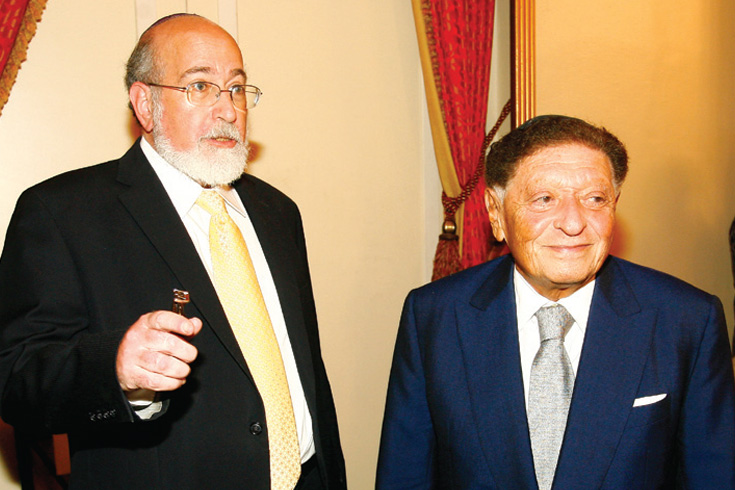
Tribute
In addition to the sense of shock and enormous sadness I felt when I heard of Sami Rohr’s death, my mind somehow immediately turned to an incident at this past year’s Rohr Awards in Jerusalem. The ceremony was ready to start, and all the attendees were seated. But two people were missing, Sami Rohr and Abigail Green, our second place winner, and ‘the author of Moses Montefiore: Jewish Liberator, Imperial Hero. I found them seated just outside the room where the awards were being presented.
Sami had asked to meet with Abigail because he had so enjoyed her book and wanted to discuss it. I turned to George, “Who should interrupt to tell your father that the ceremony is supposed to begin now, his son or the MC?” George smiled and said, “The MC.” I walked over and quietly told Sami that the people inside were ready to start, and he waved me away in a gentle manner; “I want to speak with Professor Green,” he told me. A minute or two later they came in. That image stayed with me because it reminded me of why the Rohr family established the Sami Rohr Prize for Jewish Literature in Sami Rohr’s honor. Books mattered to him and writers mattered to him. He would read and luxuriate over books. And, as I witnessed that evening at the King David Hotel in Jerusalem, he wanted to learn from writers as well. The sense of gratitude, admiration, and love for Sami Rohr felt by the Jewish Book Council runs very deep. For Sami Rohr elevated the status of writers and Jewish writing, and provided opportunities for writers who might otherwise have been confined to doing their work on a part time basis to pursue their projects with the greatest gift of all: time. Because of his passion for good writing and his largesse, there are important books that will be written that, if not for him, might not have been produced. Among the things that motivated Sami was an extraordinary belief not just in the written word (he used to offer a weekly class in the Torah portion, the very personification in Jewish life of the written word), but in the unique talents of individuals. An omnivorous reader, Sami liked to quote Goethe: “For the greatest work to be accomplished, there suffices one head for a thousand hands.” He wanted to search out those heads and offer writers inducements to produce works that would impact Jewish life and through Jewish life the broader world. Nor was it just young writers to whom he liked to offer such opportunities. In any setting, Sami Rohr made it a point to give young talented people a chance. His children, George, Evelyn and Lillian have told me of how, when they were still in living in Colombia, Sami would offer a young untested architect a chance to work in design at his real estate business. He would consciously seek out those whose talent might otherwise go unrecognized, who might otherwise “lack the oxygen that would help their talent to bloom.”
In raising his own family, Sami would always encourage his children to go beyond what they thought they were capable of, not in a compulsive manner, but out of a desire to show them that they could do more than they thought they could. And he wanted to encourage writers, the recipients of the Sami Rohr Literary Prize and all the nominees, in the same way he wanted to encourage his children, in the same way he wanted to encourage that young untested architect in Bogotá, to “Go for it.”
The Jewish Book Council was blessed, and will always be blessed to have had Sami Rohr and Sami Rohr’s vision in our lives. Joseph Telushkin